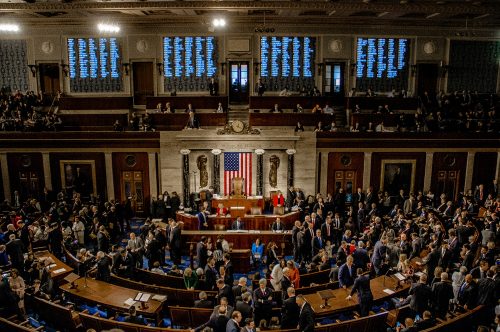A year ago yesterday, Republicans in Congress cut taxes for the wealthiest Americans. Corporations and millionaires benefited greatly from the Tax Cuts and Jobs Act, while the middle class were the losers.. What most Americans don’t know, however, is the identity of one group who received a particularly massive windfall from this legislation– the Republican who wrote it. Through manipulation of the “pass-through” filing status, fifteen Republicans from tax-writing committees will receive an average tax cut of $314,000 this year, based upon pass-through income information contained in their financial disclosure forms.
Originally, the “pass-through” tax status was intended to help small business owners by allowing earnings to be passed through to them to be taxed at the personal income rate instead of the corporate tax rate. The Tax Cuts and Jobs Act made this filing status even more lucrative by including a 20% deduction of business income from pass-through owner’s taxes. For example, a pass-through that brings in $100,000 would only be taxed on $80,000. This was included with the stated intention of helping small businesses, but just 10% of taxpayers claiming pass-through income are actual small business employers.
The other 90% include taxpayers looking to lower their tax responsibility, with half of pass-through income being claimed by those who conduct no business activity at all. According to ThinkProgress, all fifteen Republicans who had a hand in last year’s tax bill fall into the latter category, and stand to gain $314,000 on average in tax savings. This list includes Speaker Paul Ryan (WI), and Reps. Vern Buchanan (FL) and Diane Black (TN). Rep. Buchanan and Rep. Black are both members of the House Ways and Means Committee, and stand to gain anywhere from $371,752 to $2,131,750, and from $171,501 to $1,045,000, respectively. Sen. Bob Corker (TN) is also on the list. As many may remember, he originally vowed to oppose any legislation that added to the deficit. Ultimately, however, he voted for the final bill which made the pass-through deduction more generous for real estate investors such as himself.
While marketing their tax cuts last year, Republicans claimed their new tax code would be more fair and more simple. But the retention of the “pass-through” loophole that overwhelmingly helps s select few shows yet again that all of the hype was a lie. The preservation and enlargement of this loopholed not only benefited the above members of the House, but made it more personally lucrative for Sen. Corker to vote in favor of the legislation. We can be sure this was not coincidence.
Some might argue that members of Congress will inevitably benefit from any tax cuts since, like other Americans, they pay some form of income taxes. While this is true, the extent to which tax-writing members of Congress have benefitted is disproportional at best, and self-interested tax relief at worst. More importantly, with no discernible positive effects for the middle class a year out, it becomes ever more clear that the Tax Cuts and Jobs Act was not meant to benefit the taxpayers it was marketed to.
